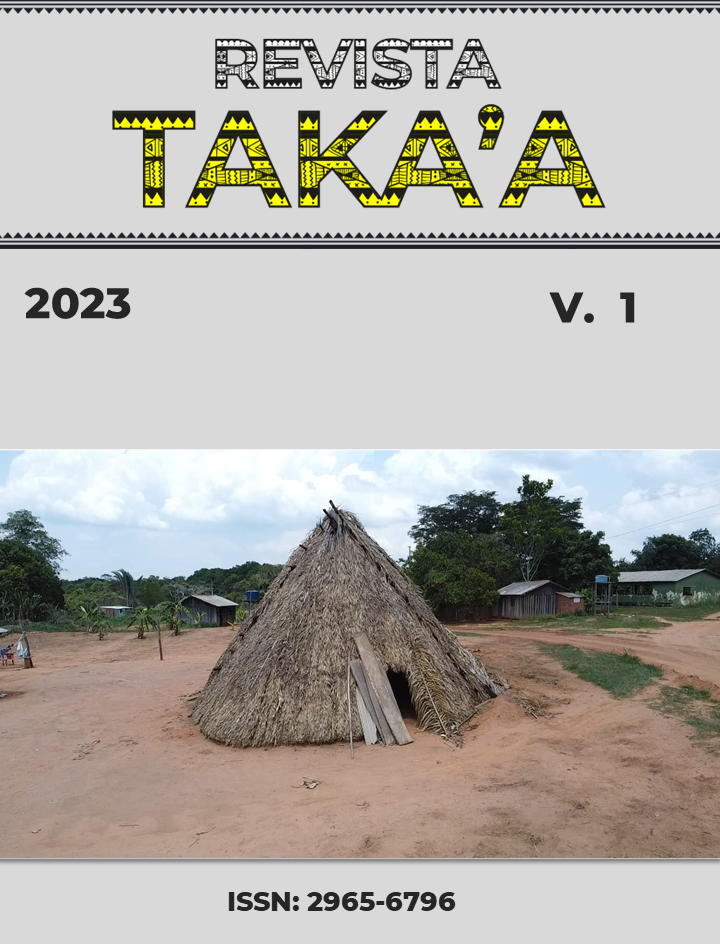CONNECTING ROOTS: THE IMPORTANCE OF THE ‘INDIGENOUS KNOWLEDGE ACTION’ PROJECT IN THE SCHOOL CURRICULUM
Keywords:
Indigenous knowledge, school curriculum, cultural diversity, pedagogical practices, cultural identityAbstract
The article highlights the need to integrate indigenous knowledge into the educational context as a way of promoting a more inclusive and respectful education for cultural diversity. The objective of the study is to analyze how the appreciation and integration of indigenous knowledge in the school curriculum contributes to the preservation of cultural identity and the strengthening of communities. The “Indigenous Knowledge Action” Project is the main intercessor of this article to carry out the analyses. The research adopts a qualitative approach, involving bibliographical research and analysis of traditional pedagogical practices of indigenous peoples, with a focus on interdisciplinarity and the relationship with the environment. In the end, it is understood that the inclusion of indigenous knowledge in the school curriculum is fundamental to enrich the educational process, promote the appreciation of the culture and history of these peoples, and encourage the formation of critical citizens aware of cultural diversity. The appreciation and integration of indigenous knowledge into the school curriculum is essential for preserving cultural identity, strengthening communities and promoting a more inclusive and diverse education, contributing to the construction of a fair and egalitarian society.
Downloads
References
AZINARI, Amanda Pereira da Silva. Interculturalidade e o desenvolvimento profissional docente no contexto das diferenças culturais. Revista da Faculdade de Educação, [S. l.], v. 38, n. 2, p. 59–74, 2022. DOI: 10.30681/21787476.2022.38.5974. Disponível em: https://periodicos.unemat.br/index.php/ppgedu/article/view/10991. Acesso em: 11/03/2023.
FREIRE, P. Pedagogia da autonomia: saberes necessários à prática educativa. 39. ed. São Paulo: Paz e Terra, 1996.
JARDIM, Fernanda Ojeda. Educação Escolar Indígena: Interculturalidade e Aspectos Históricos. In: IV Seminário formação docente; Intersecção entre universidade e escola; “Educação Pública em Tempos de Reformas”. Dourados- M, de 09 a 11 de setembro de 2019.
LUCIANO, Gersem dos Santos. O Índio Brasileiro: o que você precisa saber sobre os povos indígenas no Brasil de hoje. Brasília: LACED/Museu Nacional, 2006.
MINAYO, M. C. S. (2012). Análise qualitativa: teoria, passos e fidedignidade. Ciência & Saúde Coletiva, 17(3), 621-626.
MOREIRA, Rosângela Gomes. Ação Saberes Indígenas na Escola: Contribuições da ASIE para as Comunidades Apiaká, Kayabi/Kawaiwete, Munduruku, Kayapó e Terena- Rede UFMT/Polo de Sinop. Dissertação de Mestrado, Universidade do Estado de Mato Grosso, Cáceres-MT, 2020
MUNDURUKU, Daniel. O banquete dos deuses: conversa sobre as origem da cultura brasileira/ Daniel Munduruku; ilustrações Mauricio Negro. 2.ed. – São Paulo: Global ,2009.
MUNDURUKU, Daniel. O Karaíba: uma história do pré-Brasil/ Daniel Munduruku; ilustrações Mauricio Negro. -São Paulo: Editora Melhoramentos, 2018. ISBN 978-85-06-08319-2
OLIVEIRA, V. S.; SANTANA, M. Ancestralidades, identidade étnica e etnicidades no centro da resistência. ODEERE – Revista do Programa de Pós-Graduação em Relações Étnicas e Contemporaneidade, Volume 4, número 8, Julho - Dezembro de 2019. ISSN: 2525-4715.
PESOVENTO, Adriane. História da educação indígena e colonialidade/ Adriane Pesovento, Nicanor Palhares Sá, Sandra Jorge Da Silva. – Cuiabá; EdUFMT, 2012.
PRAÇA, Fabíola Silva Garcia. Metodologia da pesquisa científica: organização estrutural e os desafios para redigir o trabalho de conclusão - 2015.
SILVA, Tomaz Tadeu da. S586d Documentos de identidade; uma introdução às teorias do currículo/ Tomaz Tadeu da Silva . -3. ed.; 8. reimp. -Belo Horizonte: Autêntica Editora, 2016. 156 p.ISBN 978-85-86583-44-5
VEIGA-NETO, A.. (2002). De geometrias, currículo e diferenças. Educação & Sociedade, 23(79), 163–186. https://doi.org/10.1590/S0101-73302002000300009
XERENTE, C. K. SABERES INDÍGENAS NA ESCOLA. Articulando e Construindo Saberes, Goiânia, v. 2, n. 1, 2017. DOI: 10.5216/racs.v2i1.48999. Disponível em: https://revistas.ufg.br/racs/article/view/48999. Acesso em: 10 fev. 2024.
ZOIA, Alceu; MENDES, Matilde. Alguns aspectos da luta pela efetivação do direito à autodeterminação do povo indígena paiter suruí: a educação, a cultura e a terra. Revista da Faculdade de Educação, [S. l.], v. 33, n. 1, p. 247–268, 2020. DOI: 10.30681/21787476.2020.33.247268. Disponível em: https://periodicos.unemat.br/index.php/ppgedu/article/view/4794. Acesso em: 24 mar. 2024.





